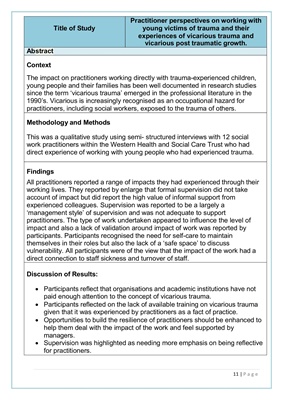
11 | P a g e
Title of Study
Practitioner perspectives on working with
young victims of trauma and their
experiences of vicarious trauma and
vicarious post traumatic growth.
Abstract
Context
The impact on practitioners working directly with trauma-experienced children,
young people and their families has been well documented in research studies
since the term 'vicarious trauma' emerged in the professional literature in the
1990's. Vicarious is increasingly recognised as an occupational hazard for
practitioners, including social workers, exposed to the trauma of others.
Methodology and Methods
This was a qualitative study using semi- structured interviews with 12 social
work practitioners within the Western Health and Social Care Trust who had
direct experience of working with young people who had experienced trauma.
Findings
All practitioners reported a range of impacts they had experienced through their
working lives. They reported by enlarge that formal supervision did not take
account of impact but did report the high value of informal support from
experienced colleagues. Supervision was reported to be a largely a
'management style' of supervision and was not adequate to support
practitioners. The type of work undertaken appeared to influence the level of
impact and also a lack of validation around impact of work was reported by
participants. Participants recognised the need for self-care to maintain
themselves in their roles but also the lack of a 'safe space' to discuss
vulnerability. All participants were of the view that the impact of the work had a
direct connection to staff sickness and turnover of staff.
Discussion of Results:
Participants reflect that organisations and academic institutions have not
paid enough attention to the concept of vicarious trauma.
Participants reflected on the lack of available training on vicarious trauma
given that it was experienced by practitioners as a fact of practice.
Opportunities to build the resilience of practitioners should be enhanced to
help them deal with the impact of the work and feel supported by
managers.
Supervision was highlighted as needing more emphasis on being reflective
for practitioners.